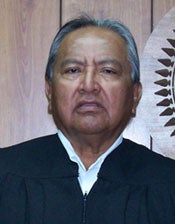Post Date: April 11, 2006
On Wednesday, April 12th at 4:30 p.m., the Supreme Court of the Navajo Nation will convene in the Ames Courtroom at Harvard Law School to hear the case of Perry v. Navajo Nation Labor Commission. The Navajo court will not only hear a current case while at Harvard, but also offer students the chance to gain first-hand insight into one of the nation’s most influential tribal courts.
“For only the second time in the history of Harvard Law School, a tribal court will sit to hear oral arguments in a case from its docket,” said Michael Masters, a third-year student and a principal organizer of the event. “The court’s visit is an opportunity for the faculty and students of Harvard Law School, and for the public, to better understand more about the interesting world of tribal law as well as how the Supreme Court of the Navajo Nation works.”
Chief Justice Herb Yazzie, Justice Lorene Ferguson and Justice Louise Grant will be in attendance for arguments in the case, which focuses on a wrongful discharge complaint by the petitioner.
“There are more than 550 federally recognized Indian nations in the U.S., and their court systems co-exist with the state and federal courts in exercising jurisdiction over a wide range of cases,” said Professor Joseph Singer, an expert in American Indian law. “These courts use both traditional and innovative procedures, some of which have been copied in some non-Indian courts.”
The judicial system of the Navajo Nation is the most active tribal judicial system in the United States, with a case load that rivals, and in some instances exceeds, many municipal, county and state judicial systems. The Court’s visit is an opportunity for the faculty and students of Harvard Law School, and for the public, to better understand how the Supreme Court of the Navajo Nation works. The visit of the Court will also provide an opportunity to share ideas about Indian policy and to discuss the future of American Indian judicial systems.
The Harvard Navajo event is sponsored by Harvard Law School and the Harvard University Native American Program. Click here to learn more about the Navajo event, which is free and open to the public.
